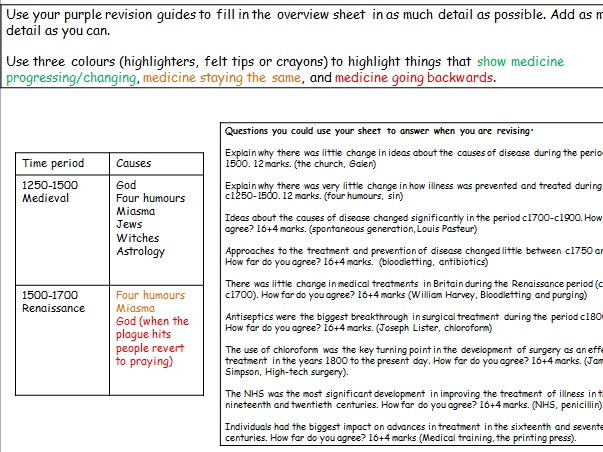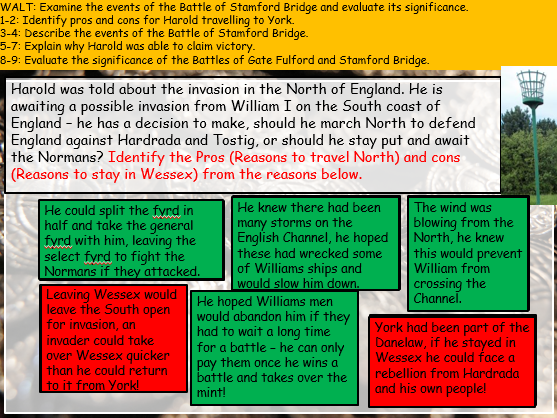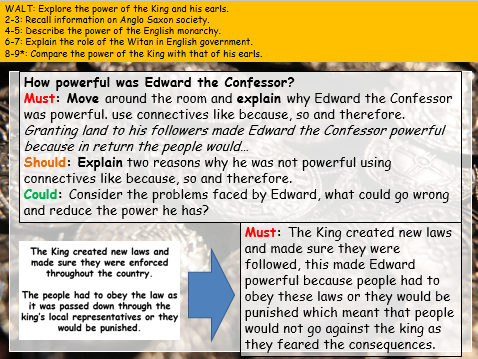
177Uploads
75k+Views
23k+Downloads
All resources

Medicine Through Time Overview Revision HW Edexcel History 9-1
This homework/revision activity is aimed at getting pupils to consider all of the content they have learnt over the course and get it onto one sheet. They then colour code progress, stagnation and regression to support with the explain why and how far do you agree questions. On the back of the sheet is a WAGOLL, instructions and some example questions for pupils to use to support their revision.
Aimed for use with the purple revision guides (pearson) but can be easily adapted for pupils to do from memory, or other revision guides that your school are using.

The Battle of Stamford Bridge (Anglo-Saxon and Norman England (Edexcel 9-1))
WALT: Examine the events of the Battle of Stamford Bridge and evaluate its significance.
1-2: Identify pros and cons for Harold travelling to York.
3-4: Describe the events of the Battle of Stamford Bridge.
5-7: Explain why Harold was able to claim victory.
8-9: Evaluate the significance of the Battles of Gate Fulford and Stamford Bridge.
Pupils evaluate whether Harold should have travelled to York before watching a video that examines the events of Stamford Bridge (Video worksheet included) they then explain the main reason that they think Harold won the battle before evaluating the impact the battle may have on the Battle of Hastings.

The Lean Years 1924-28 (Weimar and Nazi Germany: Edexcel 9-1)
WALT: Evaluate why the Nazi Party only received 2.6% of the vote in 1928.
Identify the meaning of the phrase ‘ Lean Years’.
Describe features of the period 1924-28.
Explain why circumstances in Germany lead to little support for the Nazis.
Evaluate why the Nazi Party only received 2.6% of the vote in 1928.
Starter: Pupils complete a freya model with the meaning of 'lean years’
Task one: Describe features of the period 24-28 - pupils complete a carousel task, differentiated worksheet and answer sheet provided
Task Two: Explain why circumstances in Germany lead to little support for the Nazis (see cover photo for activity), WAGOLL and answer slide provided to go through with pupils
Task three: Evaluate why the Nazi’s received 2.6% of the vote: Explain why exam question with sentence starters for PEEL structure.

Controlling Religion (Weimar and Nazi Germany: Edexcel 9-1)
WALT: Analyse how far Hitler succeeded in controlling religion.
Identify Hitler’s early policy towards the Church in the Enabling Act.
Describe how Hitler hoped to control the Catholic and the Protestant Church.
Explain why not everyone accepted Hitler’s policies about religion.
Analyse a source to explain how useful it is to a historian examining the catholic response to Hitler’s reforms.
Task one: pupils examine a source from the Enabling Act explaining how Hitler wanted his relationship to look with the church and make an inference
Task two: Carousel activity - how did Hitler gain control of the church? was there any immediate opposition (covered in more detail in a church opposition lesson).
Task three: how far did Hitler succeed in controlling the church? discussion
Task Four: How useful question including structure to guide weaker pupils and key words to prompt focus on knowledge and judgement. Full mark answer accompanies so that you can go through expectations for the 8 mark question with pupils and allow them to self assess and improve their own work based on the example.

Slave Punishments
Designed to teach pupils the meaning of the word consequences - reflection of the command words for new specification at GCSE.
Why were slaves treated brutally?
How were they punished?
What actions were punishable?
Consequences of misbehaving.

Transcontinental Railroad (American West (Edexcel history 9-1))
Transcontinental railroad lesson with skills building narrative account section.
Fully supported with differentiated worksheets to allow lower ability pupils to access learning.

Kings and Earls comparison (Edexcel 9-1: Anglo Saxon and Norman England)
This lesson has been designed to embed comparison skills needed for the 16 mark question in paper two Anglo-Saxon and Norman England.
Pupils will:
WALT: Explore the power of the King and his earls.
2-3: Recall information on Anglo Saxon society.
4-5: Describe the power of the English monarchy.
6-7: Explain the role of the Witan in English government.
8-9*: Compare the power of the King with that of his earls.
Tasks include:
a carousel
comparison worksheet in which pupils catagorise their ideas and develop comparative thought.
16 mark question with support for PEEL paragraph structuring.
AFL and differentiation throughout

What is Slavery? Introduction
What is slavery?
Comparison activity of slavery - Egyptian, Medieval, Empirical and Modern
Source analysis
Level 3-6 (NC) differentiation
Homework activity - pupils to research the four periods and draw a picture to represent slavery during that time period.

Slave Rebellion and Opposition 18th-19thC
Carousel task including:
Stono Rebellion
NY City Conspiracy
Gabriel's Conspiracy
German Coast Uprising
Nat Turner's Rebellion
Investigation of interpretations
Peer assessment
Worksheets as hidden slides

Gate Fulford 1066 (full lesson with animated battle strategy)
Full lesson aimed at KS3 examining that battle of Gate Fulford.
WALT: Examine the events of Gate Fulford.
WILF 1: Identify key things that happened at Gate Fulford. L3.
WILF 2: Describe what happened at Gate Fulford. L4.
WILF 3: Explain why Edwin and Morcar lost the Battle of Gate Fulford. L5.
Fully animated battle strategy.
Discusses Tostig, Hardrada, Edwin and Morcar - lesson has been aimed at preparing KS3 to study Normans at KS4 through the Edexcel examination board.
Differentiation and worksheets as hidden slides within the powerpoint

Early Government Acts (American West (Edexcel history 9-1))
Indian Appropriation Act
Indian Removal Act
Indian Trade and Intercourse act
All explored in detail within the lesson.
Homework included (narrative account of early government actions)

Mock and Feedback Lesson (American West (Edexcel 9-1))
An American West mock that follows the new specification, questions cover a breadth of knowledge and target pupils to answer questions about key developments of the unit. I plan to deliver this half way through teaching (after cattle industry) and will follow it with another at the end of the unit.
There is a full feedback lesson included that focuses on pupils ability to answer and understand the examination questions, could be used as a walking talking mock for GCSE revision.
In addition, there is a narrative account homework included (differentiated) to link to the last task.

REVISION Rebellions and exam skills (Edexcel 9-1: Anglo Saxon and Norman England)
WALT: Revise the rebellions against William and evaluate how big of a threat they made towards his reign
Identify reasons people were upset with William’s leadership
Describe each rebellion.
Compare rebellions to explain how William responded to each threat.
evaluate how far you agree with a statement to come to a clear judgement
As with all of my revision lessons the worksheets cover all tasks so that pupils do not require their exercise books.
Task one: what did people have to be unhappy about?
Task two: Video task
Task three: line task (pictured as cover image) alongside information sheet to help pupils remind themselves of key content.
Task four: Exam question from past paper fully planned on slides to support pupils

REVISION STARTER ACTIVITIES: Entire unit quizzes, Weimar and Nazi Germany (Edexcel 9-1)
These quizzes have been designed as 5, 4, 3, 2, 1 tasks to drop into other lessons.
The idea is to use them as a way to interleave prior knowledge into current topics and ensure that knowledge is returned to frequently to develop knowledge retention.
The 5, 4, 3, 2, 1 structure gives students instant formative assessment in which they can then choose a topic to ‘pledge’ to revise that week as part of their homework. Every quiz has a green pen slide with answers to go through with students to support the teacher.
Students find these tasks very fun and engaging and can see where their strengths and weaknesses across a topic lie.
I have designed the task to revise important concepts briefly at least once by the time they have completed all of the starter activities. The activities could also be used as a building block to help students identify what they will be doing for the rest of the lesson (to be used closer to exams when completing revision tasks).

Nazi Opposition (Church and Youth Groups) (Edexcel 9-1: Weimar and Nazi Germany)
Revision lesson that explores the church and youth groups
pupils colour code the actions of each group and spend the majority of the lesson exploring and how useful question.
the sources are about the reactions of the Nazis towards the opposition groups.

Exoduster Movement (American West (Edexcel history 9-1))
Exploration of the significance of the Exoduster movement as a case study.
All tasks fully differentiated, carousel with gap fill for weaker pupils and every task must/should/could to support and challenge.

Homesteaders inventions (American West (Edexcel history 9-1))
Lesson covers:
Homestead act
Inventions supporting homesteaders: barbed wire, sod houses etc.
Final task has option as a carousel or a comprehension task - both included.

Ranching (American West (Edexcel history 9-1))
American West Ranching lesson includes explain two consequences question with differentiated options for HA/MA and printable sentence starters for LA pupils.

Cattle Industry Decline (American West (Edexcel history 9-1))
Lesson that explores the consequences of the end of the cattle industry.
Includes differentiated carousel and exam question (two consequences of…)

Norman Conquest (Edexcel history 9-1) Norman Invasion of England: troops
This lesson compares housecarls, knights, fyrdsmen and footsoldiers.
Lesson is fully differentiated with tasks based at different grades to stretch and challenge learners, there is also polish differentiation attached with the tasks and key words translated for EAL pupils.




















